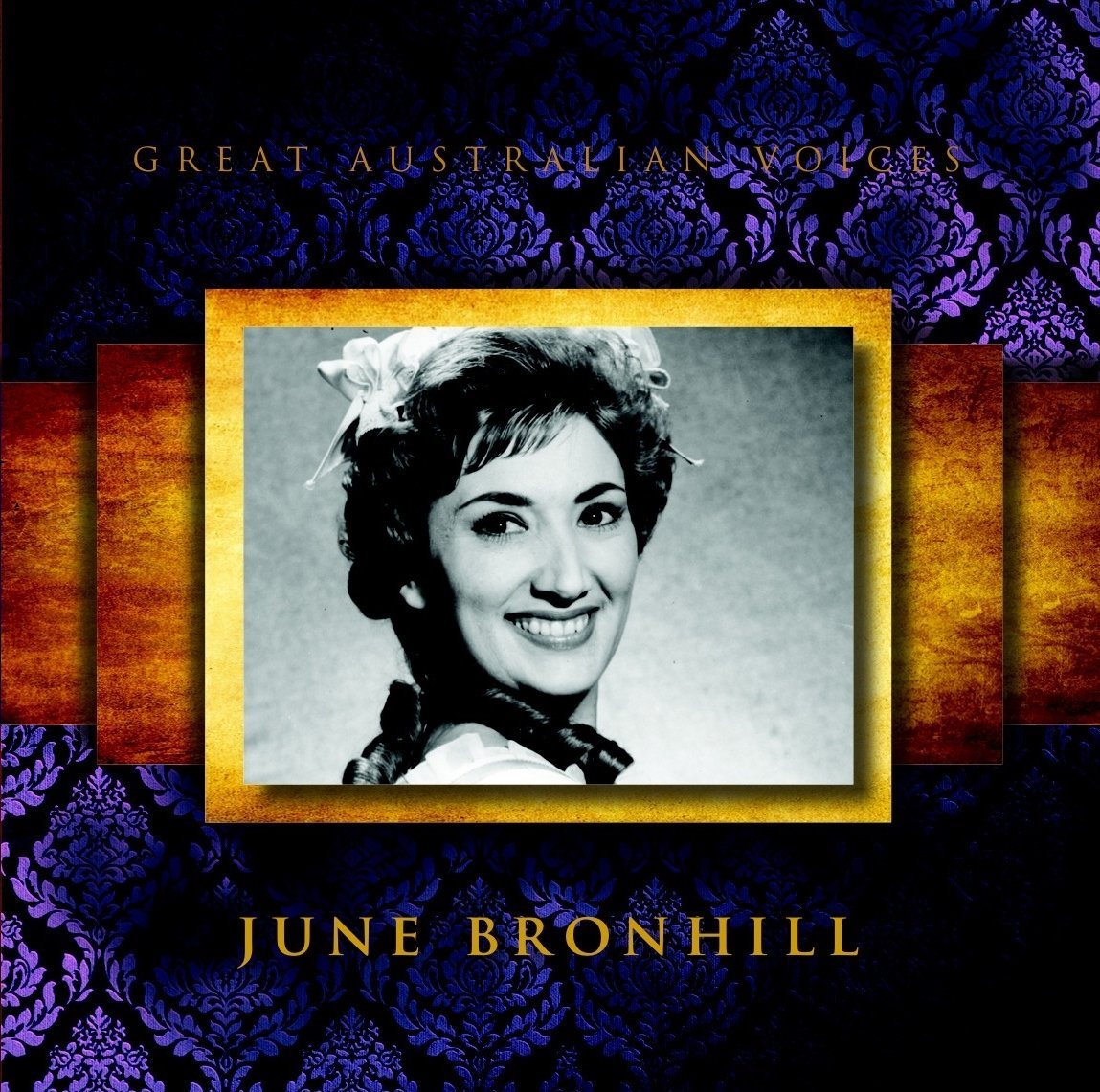
Desirée records GAV 003
JUNE BRONHILL, GREAT AUSTRALIAN VOICES , VOLUME THREE

Desirée records GAV 003
June Bronhill was very much an 'Anglo' phenomenon. Popular with British and Australian audiences she was also regrettably pretty much unknown to other parts in the world. As a young Flemish collector I had never heard of her until in 1982 I bought an LP of hers – June Bronhill live at the Sydney opera house - in a London second hand store. I was mightily impressed and went on a hunt for her other sometimes unfindable records. For a long time she wasn’t blessed by the CD medium either until the first three cd release in 2007 by EMI « the platinium collection » which featured her musical repertoire except for Rosina’s aria from Barbieri. That set has since long disappeared and the possessors of it must cling to it as if their lives depend on it as even on ebay the set never ever turns up.
So we must now be extremely grateful to Désirée records for this brand new 3 cd set, the third release in their Great Australian Voices project. Lucky we are too that this new set mainly focusses on her operatic appearances. A repertoire she hardly recorded commercially. As in the two previous Désirée releases of Nance Grant and Robert Allman (click here) the Bronhill set is a collector’s dream as the three CD’s are housed in a stylish and lavishly illustrated 52 pp book.
The never-before-released recordings are accompanied by a biography, numerous rare photos and reminiscences from colleagues ànd her most enthusiastic admirer.
Like all great voices the Bronhill voice has an instantly recognizable timbre. It is mainly a lyric-coloratura voice of extended range and fine quality. She was a student of Dino Borgioli during her London days. In her autobiography « The merry Bronhill » she refers to Borgioli in great admiration. . Her secure coloratura singing is neat and accurate and Borgioli managed to install a decent amount of Italianate phrasing in her singing style. The live performance excerpts not only display crisp crystalline diction but also an extraordinary ability to communicate with her audiences. She must have been a vivacious and charming actress with a delightful personality. She also retained much of her vocal power until the end of her career.
Included are excerpts from the Australian cast (1966) of Ron Grainer’s Robert and Elizabeth. Grainer’s most well-known tune is without doubt the television theme to the Doctor Who series but his first attempt at a stage musical was a huge hit when it opened in London’s West End in 1964. The role of Elizabeth was centred on Bronhill who was then at the peak of her vocal powers. Bronhill can also be heard in excerpts from Martha with Rowland Jones as Lionel. As Norina she finds herself completely at home in three samples from Donizetti’s Don Pasquale (1968) opposite the New Zealand baritone Ronald Maconoghie and she makes Lucy’s music from Menotti’s The Telephone sound much better than it actually is. From the same composer in his much more impressive work ‘The Saint of Bleecker Street’ (not Bleeker Street as in the booklet) she performs the role of Carmela opposite Virginia Copeland’s Annina. Blonde in Mozart’s Entfuhrung came as late as 1980 in Bronhill’s career in the included recording but she still impresses with a portrayal of great conviction and sympathy.
Ten years earlier –kudos to artitstic director Joan Hammond - she appeared opposite Nance Grant’s Elizabeth in Donizetti’s Maria Stuarda. The magic provided by both Grant and Bronhill is somewhat spoiled by Richard Divall’s (not credited in the booklet) conducting which has a tendency to drift into listlessness.
In Romberg’s New Moon Bronhill gets some fierce competition from other legendaries such as Jeanette McDonald, Dorothy Kirsten or Eleanor Steber but she stands her woman easily. In 'Softly as the morning sunrise' we get the welcome opportunity of hearing the Australian born tenor and former policeman Yusef Kayrooz as Philippe. As far as I know he studied with Eugenie Triquez and later with Franz Volker but according to the booklet he also studied with Borgioli in London. He had an important career in Switzerland as a dramatic tenor (Otello, Florestan, Chenier, Manrico..) and this is the first recording of his voice to become available which adds an extra bonus to the set.
Bronhill is also a fine Gilda (Rigoletto 1975) partnered by John Shaw’s strongly sung jester and she’s indeed ‘a perfect fit’ for Magda in Puccini’s Rondine (1974). I regret she never tackled any ‘lighter’ verismo parts such as Suzel or Lodoletta. There is much more of 'the magic of Bronhill and the set possesses many more gems so you'd better run for this release as I’m confident this will turn into Désirée’s bestseller and may become unavailable before too long.
Rudi van den Bulck